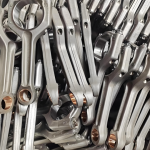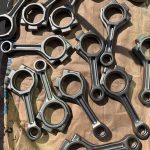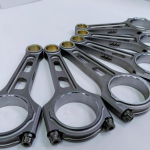Forged Connecting Rods
Forged connecting rods are a key process in engine manufacturing, and their quality directly affects engine performance and lifespan. The connecting rod is an important component in an automotive engine, playing a crucial role in engine operation.
The function of the connecting rod in an engine is to connect the piston and the crankshaft: converting the piston’s reciprocating linear motion into the crankshaft’s rotary motion, thus achieving the conversion of combustion pressure to mechanical energy. Additionally, it constrains the piston’s motion trajectory, ensuring that the piston moves strictly along the cylinder axis and prevents lateral wear.

Why Choose Die Forging for Connecting Rods?
Automotive connecting rods are high-precision, high-strength safety components. Die forging is stricter compared to other forging methods. Die forging is a type of forging that, when used in the production of automotive connecting rods, can increase the hardness and strength of the rods. Die-forged connecting rods are typically made from materials such as medium carbon steel (45# steel) and alloy steels (40Cr, 35CrMo), which provide excellent fatigue resistance and quenchability.

Key Points in Die Forging of Automotive Connecting Rods
Mold Material Selection: Forging connecting rods in Luoyang found that if conventional mold materials like H13 are used, the molds tend to soften and wear quickly. While this is considered a “normal and acceptable” phenomenon, it is actually abnormal, as the mold’s lifespan would only be around 5000 hours. It is better to use materials such as GLS steel, which can extend the mold’s service life to 14,000 hours and significantly improve the forging efficiency of the connecting rods.
Temperature Control: Initial forging temperature: 1150~1200°C (for steel), final forging temperature ≥850°C (to prevent cracks from low-temperature forging). Proper temperature control reduces rod cracking and improves yield rate.
Heat Treatment: Automotive connecting rods are heat-treated to improve hardness. The cooling rate of quenching is controlled (water quenching leads to easy deformation, while oil quenching for alloy steels is more stable). Tempering temperature is precisely controlled (e.g., for 40Cr steel, tempering is done at 550°C ± 10°C, achieving a hardness of HRC 28-32).
Precision Machining: Automotive connecting rods require high precision, which can be achieved using static machining equipment.

Advantages of Choosing Luoyang Forging
Abundant Raw Materials: We have direct access to material suppliers, ensuring the availability of materials from various countries. These include medium carbon steel, AISI 1045 (EN C45, JIS S45C), alloy steels (AISI 4140, EN 42CrMo4, JIS SCM440), and stainless steel materials (AISI 304, EN 1.4301).
Rich Forging Experience: We have a variety of molds for forging automotive connecting rods, truck connecting rods, and SUV connecting rods, along with extensive production experience.
Strong Machining Capability: Automotive connecting rods require high-precision machining. Our robust machining capabilities ensure that we can complete these processes with outstanding results.
